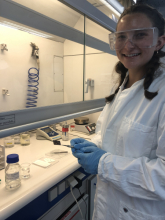
University:
Major:
Site Abroad:
Mentor(s):
Faculty Sponsor(s):
Faculty Sponsor's Department:
Project Title:
Project Description:
Proteins have traditionally been characterized using various methods of electron microscopy, including Cryo-Electron Microscopy (Cryo-EM) and (Scanning) Transmission Electron Microscopy (sTEM); however, radiation damage from the electron beam limits resolution and time to observe each sample. By encapsulating protein in a graphene liquid cell, the proteins can be observed in their native, liquid state. In our project, we investigate the ability of graphene to reduce the damage of radiation from the beam, allowing for a more in-depth investigation of each protein.
In preparation, each protein was observed with Scanning Electron Microscopy (SEM) and average dimensions were determined. Prior to testing graphene encapsulation in the TEM, two well-established methods for protecting protein were used: glucose embedding and negative staining. For samples observed in the TEM, a standard protocol was used for coating the TEM grids in single layer or 3-5 layer graphene. To create a graphene liquid cell, either an additional graphene coated TEM grid was placed on top to create a sandwich, or a single layer of graphene was placed atop the sample grid. While electron diffraction of catalase was observed with glucose embedding and negative staining, the project continues to progress in terms of graphene encapsulation. Successfully observing the electron diffraction of the proteins in a graphene liquid cell would provide a novel approach to protecting the proteins and ultimately improve the resolution of their characterization.
